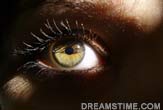Creepy Experiment Exposes Paranoia and Sense of Alien Control

The young woman went to doctors to have them probe her brain, to root out where her seizures came from. But unexpectedly, their investigations and the procedure they performed led her to experience the creepy illusion of a person standing behind her, where nobody was actually present.
The patient described the illusory person as young and of indeterminate sex, a "shadow" who did not speak or move. "He is behind me, almost at my body, but I do not feel it," she reported.
When the patient sat and embraced her knees with her arms, she noted the "man" was now also sitting and clasping her in his arms, which she described as unpleasant. When asked to read a card in her right hand, she noted the shadow tried to interfere, saying, "he wants to take the card" and "he doesn't want me to read."
Researchers said today that what they learned from this woman, who is not named in their scientific paper, could help shed light on psychiatric effects, such as feelings of alien control, paranoia and persecution.
Cognitive neuroscientist Olaf Blanke at the Swiss Federal Institute of Technology in Lausanne in Switzerland and his colleagues investigated the 22-year-old woman, who had no history of psychiatric illness. They were evaluating her for surgical treatment of epilepsy, and had implanted electrodes in her brain to study where her seizures originated.
The researchers found stimulating a region known as the left temporoparietal junction caused the woman to feel the presence of a shadowy person.
The temporoparietal junction is involved in distinguishing self from other and integrating body-related sensory information. Since the shadowy person closely mimicked the woman, the researchers propose she was experiencing an illusion based on her own body. This effect is a symptom of schizophrenia, and the scientists noted hyperactivity in the temporoparietal cortex of schizophrenics could lead to include the sensation that one's actions are being performed by someone else.
Get the world’s most fascinating discoveries delivered straight to your inbox.
"Larger studies are needed," Blanke told LiveScience. "We reported findings in a single patient."
Blanke and his colleagues report their findings in the Sept. 21 issue of the journal Nature.
- Mysteries of the Mind
- Mind Control by Parasites
- Top 10 Alien Encounters Debunked
- Life's Little Mysteries



